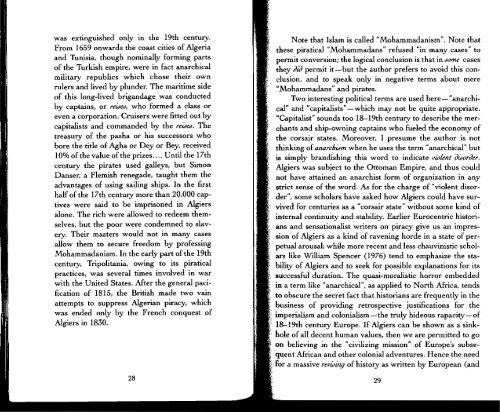Create successful ePaper yourself
Turn your PDF publications into a flip-book with our unique Google optimized e-Paper software.
was extinguished only in the 19th century.<br />
From 1659 onwards the coast cities of Algeria<br />
and Tunisia, though nominally forming parts<br />
of the Turkish empire, were in fact anarchical<br />
military republics which chose their own<br />
rulers and lived by plunder. The maritime side<br />
of this long-lived brigandage was conducted<br />
by captains, or reiJeq, who formed a class or<br />
even a corporation. Cruisers were fitted out by<br />
capitalists and commanded by the reiJeq. The<br />
treasury of the pasha or his successors who<br />
bore the title of Agha or Dey or Bey, received<br />
10% ofthe value ofthe prizes.... Until the 17th<br />
century the pirates used galleys, but Simon<br />
Danser, a Flemish renegade, taught them the<br />
advantages of using sailing ships. In the first<br />
half of the 17th century more than 20,000 captives<br />
were said to be imprisoned in Algiers<br />
alone. The rich were allowed to redeem themselves,<br />
but the poor were condemned to slavery.<br />
Their masters would not in many cases<br />
allow them to secure freedom by professing<br />
Mohammadanism. In the early part ofthe 19th<br />
century, Tripolitania, owing to its piratical<br />
practices, was several times involved in war<br />
with the United States. After the general pacification<br />
of 1815, the British made two vain<br />
attempts to suppress Algerian piracy, which<br />
was ended only by the French conquest of<br />
Algiers in 1850.<br />
28<br />
Note that Islam is called "Mohammadanism". Note that<br />
these piratical "Mohammadans" refused "in many cases" to<br />
permit conversion; the logical conclusion is that in ,;orne cases<br />
they iJiiJ permit it-but the author prefers to avoid this conclusion,<br />
and to speak only in negative terms about mere<br />
"Mohammadans" and pirates.<br />
Two interesting political terms are used here-"anarchical"<br />
and "capitalists"-which may not be quite appropriate.<br />
"Capitalist" sounds too 18-19th century to describe the merchants<br />
and ship-owning captains who fueled the economy of<br />
the corsair states. Moreover, I presume the author is not<br />
thinking ofanarchMm when he uses the term "anarchical" but<br />
is simply brandishing this word to indicate .,iolent iJMoriJcr.<br />
Algiers was subject to the Ottoman Empire, and thus could<br />
not have attained an anarchist form of organization in any<br />
strict sense of the word. As for the charge of "violent disorder",<br />
some scholars have asked how Algiers could have survived<br />
for centuries as a "corsair state" without some kind of<br />
internal continuity and stability. Earlier Eurocentric historians<br />
and sensationalist writers on piracy give us an impression<br />
of Algiers as a kind of ravening horde in a state of perpetual<br />
arousal; while more recent and less chauvinistic scholars<br />
like William Spencer (1976) tend to emphasize the stability<br />
of Algiers and to seek for possible explanations for its<br />
successful duration. The quasi-moralistic horror embedded<br />
in a term like "anarchical", as applied to North Africa, tends<br />
to obscure the secret fact that historians are frequently in the<br />
business of providing retrospective justifications for the<br />
imperialism and colonialism-the truly hideous rapacity-of<br />
I8-19th century Europe. IfAlgiers can be shown as a sinkhole<br />
of all decent human values, then we are permitted to go<br />
on believing in the mission" of Europe's subsequent<br />
African and other colonial adventures. Hence the need<br />
for a massive rCPMing of history as written by European (and<br />
29


